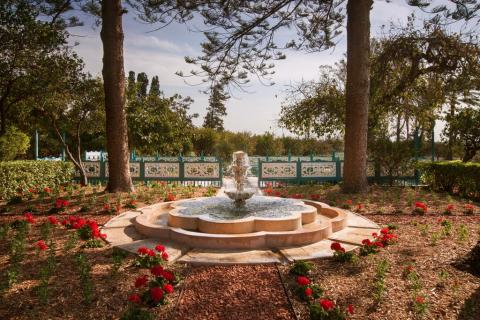‘Abdu’l-Bahá, in appearance, was a man of medium height though to all who met Him, He gave the impression of such majesty that He seemed much taller. His beard was flowing and white; His head covering, whether a turban or tarboosh, was white also. But, meeting Him, none of these details were even noticed. It was only the spirit one felt and the outpouring love. Love filled Him and flowed out from Him to bathe and encompass everyone in His presence. He was, as we all know, the Mystery of God. His Station is unique. There has been no one like Him in any past religious era, nor will there ever be such in the future. Bahá’u’lláh had bestowed upon Him the assurance of God's guidance in His explanations of anything in the Teachings that needed clarifying for the believers and, when He was but ten years old, His Father, Bahá’u’lláh, addressed Him and referred to Him as 'the Master.' He was the perfect Exemplar of the Bahá’í Teachings: He lived by prayer and wished only to be known as ‘Abdu’l-Bahá the servant of the servants. He made no mistakes. Yet, with all this, He needed, as we all need, the constant attitude of prayer to renew and revivify Him, and, urging us ever upward. His constant adjuration was, "Do as I do. Be as I am.
Abdu’l-Bahá
No mere mortal in His day could claim to be His teacher. He learned well and thoroughly. When, late in His life, Bahá’u’lláh took up residence at Bahji, the Master remained in ‘Akka to attend to a multitude of details, which otherwise might have distracted Bahá’u’lláh from His writing. But frequently the Master carried news to Bahji. He then reported on religious questions He had encountered. It was observed that Bahá’u’lláh asked for His answers and then approved them with ‘very good’. His wisdom was as astonishing as His knowledge. The Master’s profound wisdom coupled with His all-encompassing, tender love were capable of producing a revolution in the inner life of those with whom He came in contact. This revolution was a ‘change of heart’. Horace Holley became ‘conscious of a new sympathy for individuals and a new series of ties by which all men are joined in one common destiny.’ He discovered that ‘Abdu’l-Bahá restores man to his state a little lower than the angels.’
George Townshend, one-time Canon of St Patrick’s Cathedral, in Dublin, Ireland and Archdeacon of Clonfort Cathedral, who became an ardent Bahá’í, wrote: . . . In ‘Abbas Effendi’s character the dominant element was spirituality. Whatever was good in His life He attributed not to any separate source of virtue in Himself but to the power and beneficence of God. His single aim was servitude to God. He rejoiced in being denuded of all earthy possessions and in being rich only in His love for God. He surrendered His freedom that He might become the bondservant of God; and was able at the close of His days to declare that He had spent all His strength upon the Cause of God. To Him God was the center of all existence here on earth as heretofore and hereafter.
One of the last pilgrims to visit ‘Abdu’l-Bahá in the Holy Land in 1921 was Anna Kunz, the daughter of a Swiss theologian who lived in Zurich in Switzerland. She later recalled, ‘As I think of him now. I always love to think, first, of his great simplicity, his marvelous humility which knows of no self existence, and last, or better, first, of his boundless love.’
Today humanity is increasingly concerned and rightly so with ‘the quality of life’. ‘Abdu’l-Bahá was absorbed with both its spiritual and its physical dimensions: He knew that as the quality of man’s spiritual life improves, his physical life would improve also the other world reflects the inner man. He was fully aware that we are indeed on a ‘spiritual journey from self to God’. He wanted all people to be aware of this vital fact also then they could truly arise to their real potential, both in this world and in the next.
